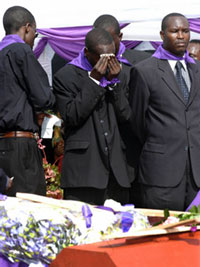Web Video: Democracy Now Reports on Rawanda’s Accusation

UNITED NATIONS (FinalCall.com) – Fourteen years after bloody 1994 genocide in Rwanda, a government commission recently issued a 500-page report charging senior French officials were complicit in the deaths of nearly one million Tutsis and Hutus.
According to news reports, the Mucyo Commission, headed by former French justice minister Jean de Mucyo, implicates some of the most senior figures in the French government at the time of the genocide. It indicts the late French President Francois Mitterrand and three former ministers, Edouard Balladur, Alain Juppe and Dominique de Villepin.
The commission accuses French forces in Rwanda of crimes against humanity and of using an UN-sanctioned haven for refugees to help extremist Hutus responsible for the 100 days of mass slaughter escape justice. French soldiers are also accused of taking part in the killings and the mass rape of Tutsi refugees.
France immediately condemned the report as “unacceptable” and tried to cast doubt on the commission’s objectivity, according to Agence France Presse. A French foreign ministry spokesman told reporters in Paris that the regime in Kigali was attempting to rewrite history. He added that the French government had yet to receive the report through official channels.
The report names 13 senior French politicians and 20 military officials and Agence France Presse reported Rwandan officials may make the first attempt by an African nation to extradite European nationals for war crimes.
Though the crime of genocide falls under international jurisdiction, legal experts say the Rwandan government could theoretically indict French nationals and request their extradition to Rwanda for trial.
Analysts like investigative reporter Linda Melvern, author of “A People Betrayed: The Role of the West in Rwanda’s Genocide” and “Conspiracy to Murder: The Rwanda Genocide,” say pointing the finger at individual political figures in France is problematic.
Ms. Melvern appeared via telephone from London on the nationally syndicated radio show Democracy Now Aug. 6. She told the host Amy Goodman the “French policy towards Rwanda had been largely decided by the former president, Francois Mitterrand, during his second term.”
France’s own inquiry in 1998 determined Mr. Mitterrand had been in overall control of the policy but was not unaccountable for what happened, Ms. Melvern said.
But, she also added, “There were French officers embedded in the elite Rwandan army units, who would have known, I am sure, what was happening. The public opening of the Mitterrand archives shows that he feared what he called a Tutsiland would be created in Rwanda and once Rwanda was lost to Anglophone influence that would be a big blow to French credibility on the continent.”
Ms. Goodman told Ms. Malvern that Kenneth Roth, of Human Rights Watch, said the timing of the report was no coincidence as international attention turns to the International Criminal Tribunal for Rwanda, which meets in Tanzania.
Pressure has been mounting in international circles for the Rwanda tribunal to follow-up on accusations by two international judges, one from Spain and one from France, that call for the indictment of President Paul Kagame for alleged involvement in the death of former Rwandan President Juvenal Habyarimana, a Hutu. After President Habyarimana’s plane was shot down over Kigali, Rwanda’s capital, on April 6, 1994, the genocide started.
“I don’t see the release of this report as a sort of tit-for-tat, as part of a diplomatic spat. It’s far too serious for that. This is a European army being accused of human rights abuses in Africa, and I think that it needs careful consideration by international human rights groups,” Ms. Melvern responded.
A French judge issued nearly a dozen warrants for members of President Kagame’s inner circle, while the Spanish judge has indicted 40 Rwandan officers on international criminal charges.
Professor Peter Erlinder, of the William Mitchell College of Law and a past president of the National Lawyers Guild, told The Final Call in an e-mail message he was surprised at the level of gullibility shown by some analysts and members of the human rights community.
These analysts and organizations swallowed the “big lie” about President Kagame wholesale, without understanding the nature of the Rwanda War, examining the factual record at the International Criminal Tribunal for Rwanda and original, contemporaneous reports from the UN and U.S., he said.
This demonstrates the manipulation of the Rwanda story to benefit a neo-colonial U.S./UK relationship with Mr. Kagame and company, said Prof. Erlinder. “The documents at the ICTR also describe a systematic cover-up of the crimes in Rwanda by the U.S. government and UN personnel, including Kofi Annan, beginning in August 1994 and continuing to present,” Mr. Erlinder charged.
One Rwanda tribunal and UN report describes how the Kagame regime is confiscating and steering the mineral resources of the Democratic Republic of the Congo to Rwanda, he said. “The Rwandan invasion of the Congo has led to a 12-year war in which nearly six million have died, although little reference is made to this in U.S. and western media. The number of civilians dying in the Congo every four months tops any number killed in Darfur, but Darfur is labeled ‘genocide,’ ” Mr. Erlinder noted.
The U.S. is pushing to end the Rwanda Tribunal’s mandate and is the biggest financial contributor to the tribunal, he said. “The U.S. wants to make it impossible to investigate and prosecute crimes by Kagame,” Mr. Erlinder charged. The International Criminal Tribunal for Rwanda’s mandate expires in December.
Some observers, speaking on condition of anonymity in United Nations corridors, said the Rwandan commission’s report is “challenging the pervasive culture of impunity now running through the veins of most western nations.”
Peter Weiss, vice president of the Center for Constitutional Rights, said the media and the justice community can become powerful voices, “if they look at the facts in the (Mucyo Commission) report, which could eventually lead to some form of accountability by France and by the French officials named in the report who are still alive.”












